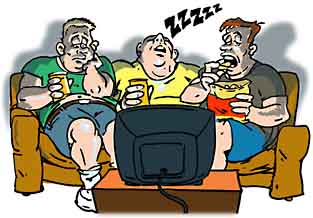Population Inversion
 Okay, Dr. Lee. I was thinking about this laser thing and there's a problem with it. You said
that we start with one photon and hit an excited atom with it, and now we have two photons,
and we keep repeating that until we have lots and lots of identical photons, and that is a laser.
Okay, Dr. Lee. I was thinking about this laser thing and there's a problem with it. You said
that we start with one photon and hit an excited atom with it, and now we have two photons,
and we keep repeating that until we have lots and lots of identical photons, and that is a laser.
 Yes. Exactly.
Yes. Exactly.
 BUT...in order to excite the atom we have to hit it with a photon to start with. So it takes
two photons to get two photons. How is THAT ever going to get us extra photons?
BUT...in order to excite the atom we have to hit it with a photon to start with. So it takes
two photons to get two photons. How is THAT ever going to get us extra photons?
 You're right. If we have to start with a photon of the correct color for each photon we
eventually get we can't win. That was where things were in Einstein's day, and so they could
not build lasers back then. Can you think of any way to get around this?
You're right. If we have to start with a photon of the correct color for each photon we
eventually get we can't win. That was where things were in Einstein's day, and so they could
not build lasers back then. Can you think of any way to get around this?
 Well, if we could get a whole bunch of the atoms excited without hitting them with photons,
then just one photon would start a big chain reaction.
Well, if we could get a whole bunch of the atoms excited without hitting them with photons,
then just one photon would start a big chain reaction.
 Right. Normally the atoms just sit in their lowest energy level, like a bunch of guys watching
football. Maybe someone goes for more chips once in a while, but usually they just sit there.
What we need to do is get lots of them on their feet at once.
Right. Normally the atoms just sit in their lowest energy level, like a bunch of guys watching
football. Maybe someone goes for more chips once in a while, but usually they just sit there.
What we need to do is get lots of them on their feet at once.
 Like if the ref made a call that these guys could clearly see was bad....
Like if the ref made a call that these guys could clearly see was bad....

| 
|
 Exactly. If we can get all the atoms to jump up into an excited state we can make a laser.
We call this a Population Inversion.
Exactly. If we can get all the atoms to jump up into an excited state we can make a laser.
We call this a Population Inversion.
 But atoms don't pay attention to refs, so how do we do it for them?
But atoms don't pay attention to refs, so how do we do it for them?
 Well, it is not so easy, but we can do it by pumping electrical energy into our atoms in
certain ways or shining different colored light at them. Both these processes stick the atoms
into much higher energy levels, and under special conditions then they jump down and
accumulate in the one excited energy level instead of going all the way to the ground state.
In the applet below, our "energy pump" takes care of all this for us.
Well, it is not so easy, but we can do it by pumping electrical energy into our atoms in
certain ways or shining different colored light at them. Both these processes stick the atoms
into much higher energy levels, and under special conditions then they jump down and
accumulate in the one excited energy level instead of going all the way to the ground state.
In the applet below, our "energy pump" takes care of all this for us.
 Oh...when an excited atom sends off a photon, it can hit more excited atoms and cause a little
landslide of more photons. But how can THIS be a laser, if the little clumps of photons can
go off in any direction?
Oh...when an excited atom sends off a photon, it can hit more excited atoms and cause a little
landslide of more photons. But how can THIS be a laser, if the little clumps of photons can
go off in any direction?
 You are right; there is one more thing we need to add. Can you think of what it might be?
You are right; there is one more thing we need to add. Can you think of what it might be?






